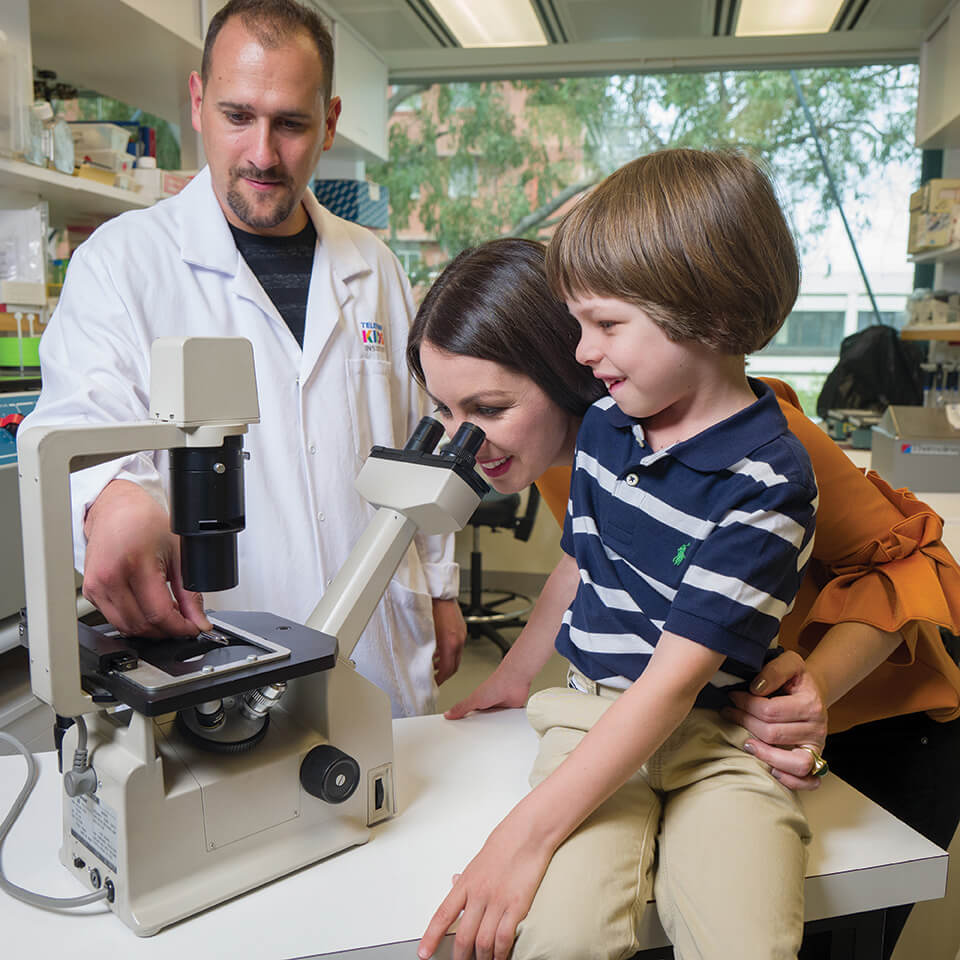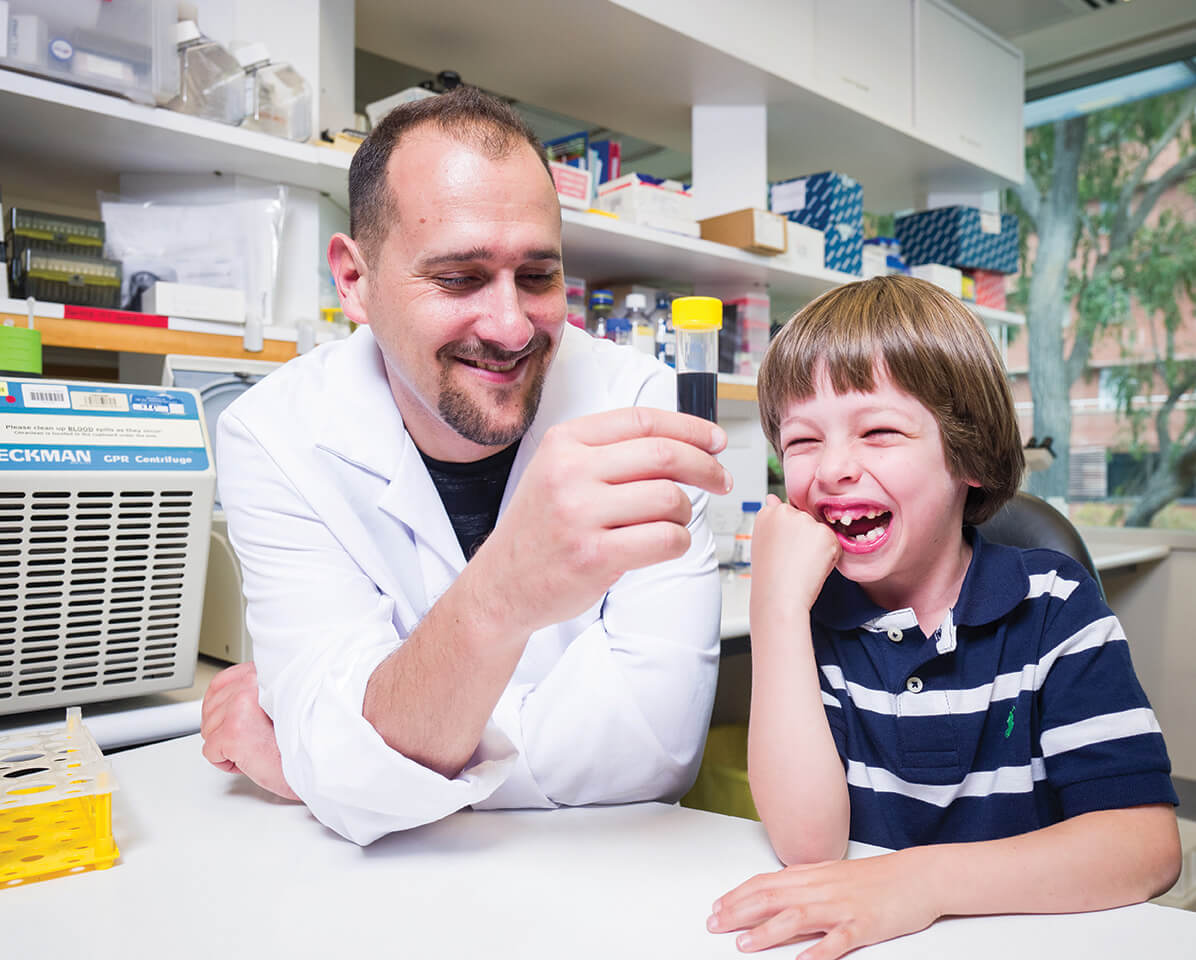
Researcher Anthony Bosco takes philanthropist Sarah D’Onofrio and son Samuel through some of his work
Traditionally, the way medicine has been practiced is to treat a condition based on the presence of symptoms. A best line of treatment is ascertained and a protocol established. Case in point: a child diagnosed with asthma has his or her treatment approached in pretty much the same way as every other child diagnosed with asthma.
“But there are many different forms of asthma, and for 10 per cent of patients, these lifesaving drugs are ineffective,” Dr Anthony Bosco, head of the Centre for Personalised Medicine for Children, points out.
“These patients do not respond to currently available treatments and that means they are in trouble. The disease could kill them. And that’s the problem; at the moment the way we deliver healthcare is reactionary and is not optimised for each patient.”
Enter the field of personalised medicine, which seeks to use genomics, or our DNA sequence, to harness the unique characteristics of each individual – to optimise their healthcare and tailor how that disease is treated.
“All the personalised medicine centres around the world pretty much focus on adults,” Anthony explains. “The Centre for Personalised Medicine for Children at The Kids Research Institute Australia is one of the first in the world that focuses on children. Our goal is to better characterise the biological mechanisms that cause disease and to develop tailored treatments that are optimised for each individual child. In the future, we may even be able to leverage the DNA sequence of each individual child to predict diseases before they even develop and try to prevent them from developing in the first place.
“Our goal is to better characterise the biological mechanisms that cause disease and to develop tailored treatments that are optimised for each individual child.”
Anthony, who was born and raised near Fremantle, Western Australia, is a systems immunologist who specialises in genomics. Considered a rising star of the field, he received a Fellowship from the Simon Lee Foundation in 2017 to enable him to do vital work on home soil.
“Anthony has the spark we were looking for in a young researcher and a perfect fit with our Simon Lee Foundation alumni,” Sarah D’Onofrio, Trustee, Simon Lee Foundation says.
“Our founder’s credo was to champion the human spirit and in Anthony we saw a motivated, committed and first-rate scientist who is a pioneer in the emerging field of personalised medicine for children. Anthony is one of WA’s top young scientists and has a promising career ahead of him, one that will directly improve the health of children and one that the Simon Lee Foundation is proud to support.”
Anthony says Fellowships are vital for independent researchers. “Fellowships are critical for job stability and security but also for research, because research grants will only fund what’s required to complete a project. I still need a salary to survive,” he says. “If I didn’t have a Fellowship, I would have had to move overseas or over east and take up a position elsewhere, rather than test my own ideas and hypotheses.”

Dr Anthony Bosco and Samuel share a laugh in the lab
Likewise, Dr Timo Lassmann, the head of Computational Biology, also received a generous Fellowship from the Feilman Foundation so he could continue his important work in the field.
John Palermo, Secretary, Feilman Foundation, says the founders of the Foundation — Mrs Ethel Feilman and her daughters Margaret and Patricia — were steadfast in their desire to make a difference, beginning with an individual’s wellbeing. “This ethos aligns with the field of personalised medicine in which research and treatments seek to achieve the best outcome for individual patients, rather than a ‘universal’ approach,” he explains. “That every human is unique and how we often differ in the way we develop diseases and respond to treatments makes for a challenging and dynamic realm. The Feilman Foundation is proud to support The Kids Research Institute Australia Fellowship program and the world-leading research being conducted by Dr Timo Lassmann in this field.”
Anthony lists vaccine responses, rare diseases and cancer as just some examples demonstrating the power of the tools and technology now at their fingertips with personalised medicine.
“The Centre initially funded two demonstration projects on vaccine responses and rare diseases,” he says.
“With vaccines, there are some parents who don’t vaccinate because they believe there are potential adverse effects. We want to use genomics to quantify vaccine responses and predict which children will potentially have adverse effects to give parents peace of mind.
“As for rare diseases, these are usually caused by a mutation in a gene that is critical for normal development. Using DNA sequencing we should be able to find that mutation.
“When it comes to cancer, different cancers have different mutations, and so the optimal treatment for each cancer depends on these mutations,” Anthony continues. “For some cases we have drugs that target specific genes but those drugs are only useful if the cancer has the relevant mutations. Hence the mutations really determine what the best therapy is.”
Anthony is excited to think of the possibilities ahead now that personalised medicine is a reality. “At the moment we’re still in the research phase. It’s a new field so there’s always a lag between doing the research and practicing it but there’s no doubt this field will revolutionise medicine over the next decade,” he says.
Want to help The Kids create a healthier future for children? People like you make all the difference. Join us by making a donation, fundraising, becoming a corporate sponsor, or making a bequest.
Fast Facts
- The Centre for Personalised Medicine for Children aims to be a multidisciplinary consortium of researchers, clinicians, data scientists and service providers working to enable the advancement of personalised medicine approaches to child health and development – tailoring healthcare to an individual’s unique genetic makeup.
- It is guided by the P4 Framework for care: Predictive, Preventative, Personalised, Participatory, and strives to foster the development of knowledge to enable more rapid diagnosis, earlier intervention and targeted treatments to improve outcomes and quality of life for patients and their families.
- The Centre has been made possible thanks to the vision and generous donations of the Stan Perron Charitable Foundation, the Simon Lee Foundation and the Feilman Foundation.
